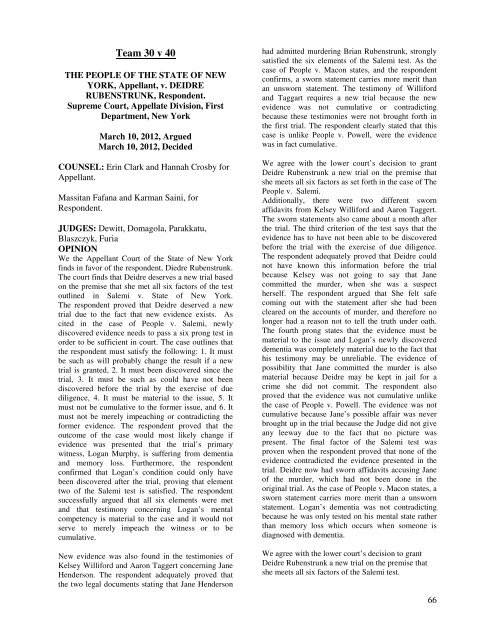2012 Conference Executive Record Report.pdf - YMCA of Greater ...
2012 Conference Executive Record Report.pdf - YMCA of Greater ...
2012 Conference Executive Record Report.pdf - YMCA of Greater ...
You also want an ePaper? Increase the reach of your titles
YUMPU automatically turns print PDFs into web optimized ePapers that Google loves.
Team 30 v 40<br />
THE PEOPLE OF THE STATE OF NEW<br />
YORK, Appellant, v. DEIDRE<br />
RUBENSTRUNK, Respondent.<br />
Supreme Court, Appellate Division, First<br />
Department, New York<br />
March 10, <strong>2012</strong>, Argued<br />
March 10, <strong>2012</strong>, Decided<br />
COUNSEL: Erin Clark and Hannah Crosby for<br />
Appellant.<br />
Massitan Fafana and Karman Saini, for<br />
Respondent.<br />
JUDGES: Dewitt, Domagola, Parakkatu,<br />
Blaszczyk, Furia<br />
OPINION<br />
We the Appellant Court <strong>of</strong> the State <strong>of</strong> New York<br />
finds in favor <strong>of</strong> the respondent, Diedre Rubenstrunk.<br />
The court finds that Deidre deserves a new trial based<br />
on the premise that she met all six factors <strong>of</strong> the test<br />
outlined in Salemi v. State <strong>of</strong> New York.<br />
The respondent proved that Deidre deserved a new<br />
trial due to the fact that new evidence exists. As<br />
cited in the case <strong>of</strong> People v. Salemi, newly<br />
discovered evidence needs to pass a six prong test in<br />
order to be sufficient in court. The case outlines that<br />
the respondent must satisfy the following: 1. It must<br />
be such as will probably change the result if a new<br />
trial is granted, 2. It must been discovered since the<br />
trial, 3. It must be such as could have not been<br />
discovered before the trial by the exercise <strong>of</strong> due<br />
diligence, 4. It must be material to the issue, 5. It<br />
must not be cumulative to the former issue, and 6. It<br />
must not be merely impeaching or contradicting the<br />
former evidence. The respondent proved that the<br />
outcome <strong>of</strong> the case would most likely change if<br />
evidence was presented that the trial’s primary<br />
witness, Logan Murphy, is suffering from dementia<br />
and memory loss. Furthermore, the respondent<br />
confirmed that Logan’s condition could only have<br />
been discovered after the trial, proving that element<br />
two <strong>of</strong> the Salemi test is satisfied. The respondent<br />
successfully argued that all six elements were met<br />
and that testimony concerning Logan’s mental<br />
competency is material to the case and it would not<br />
serve to merely impeach the witness or to be<br />
cumulative.<br />
New evidence was also found in the testimonies <strong>of</strong><br />
Kelsey Williford and Aaron Taggert concerning Jane<br />
Henderson. The respondent adequately proved that<br />
the two legal documents stating that Jane Henderson<br />
had admitted murdering Brian Rubenstrunk, strongly<br />
satisfied the six elements <strong>of</strong> the Salemi test. As the<br />
case <strong>of</strong> People v. Macon states, and the respondent<br />
confirms, a sworn statement carries more merit than<br />
an unsworn statement. The testimony <strong>of</strong> Williford<br />
and Taggart requires a new trial because the new<br />
evidence was not cumulative or contradicting<br />
because these testimonies were not brought forth in<br />
the first trial. The respondent clearly stated that this<br />
case is unlike People v. Powell, were the evidence<br />
was in fact cumulative.<br />
We agree with the lower court’s decision to grant<br />
Deidre Rubenstrunk a new trial on the premise that<br />
she meets all six factors as set forth in the case <strong>of</strong> The<br />
People v. Salemi.<br />
Additionally, there were two different sworn<br />
affidavits from Kelsey Williford and Aaron Taggert.<br />
The sworn statements also came about a month after<br />
the trial. The third criterion <strong>of</strong> the test says that the<br />
evidence has to have not been able to be discovered<br />
before the trial with the exercise <strong>of</strong> due diligence.<br />
The respondent adequately proved that Deidre could<br />
not have known this information before the trial<br />
because Kelsey was not going to say that Jane<br />
committed the murder, when she was a suspect<br />
herself. The respondent argued that She felt safe<br />
coming out with the statement after she had been<br />
cleared on the accounts <strong>of</strong> murder, and therefore no<br />
longer had a reason not to tell the truth under oath.<br />
The fourth prong states that the evidence must be<br />
material to the issue and Logan’s newly discovered<br />
dementia was completely material due to the fact that<br />
his testimony may be unreliable. The evidence <strong>of</strong><br />
possibility that Jane committed the murder is also<br />
material because Deidre may be kept in jail for a<br />
crime she did not commit. The respondent also<br />
proved that the evidence was not cumulative unlike<br />
the case <strong>of</strong> People v. Powell. The evidence was not<br />
cumulative because Jane’s possible affair was never<br />
brought up in the trial because the Judge did not give<br />
any leeway due to the fact that no picture was<br />
present. The final factor <strong>of</strong> the Salemi test was<br />
proven when the respondent proved that none <strong>of</strong> the<br />
evidence contradicted the evidence presented in the<br />
trial. Deidre now had sworn affidavits accusing Jane<br />
<strong>of</strong> the murder, which had not been done in the<br />
original trial. As the case <strong>of</strong> People v. Macon states, a<br />
sworn statement carries more merit than a unsworn<br />
statement. Logan’s dementia was not contradicting<br />
because he was only tested on his mental state rather<br />
than memory loss which occurs when someone is<br />
diagnosed with dementia.<br />
We agree with the lower court’s decision to grant<br />
Deidre Rubenstrunk a new trial on the premise that<br />
she meets all six factors <strong>of</strong> the Salemi test.<br />
66
















